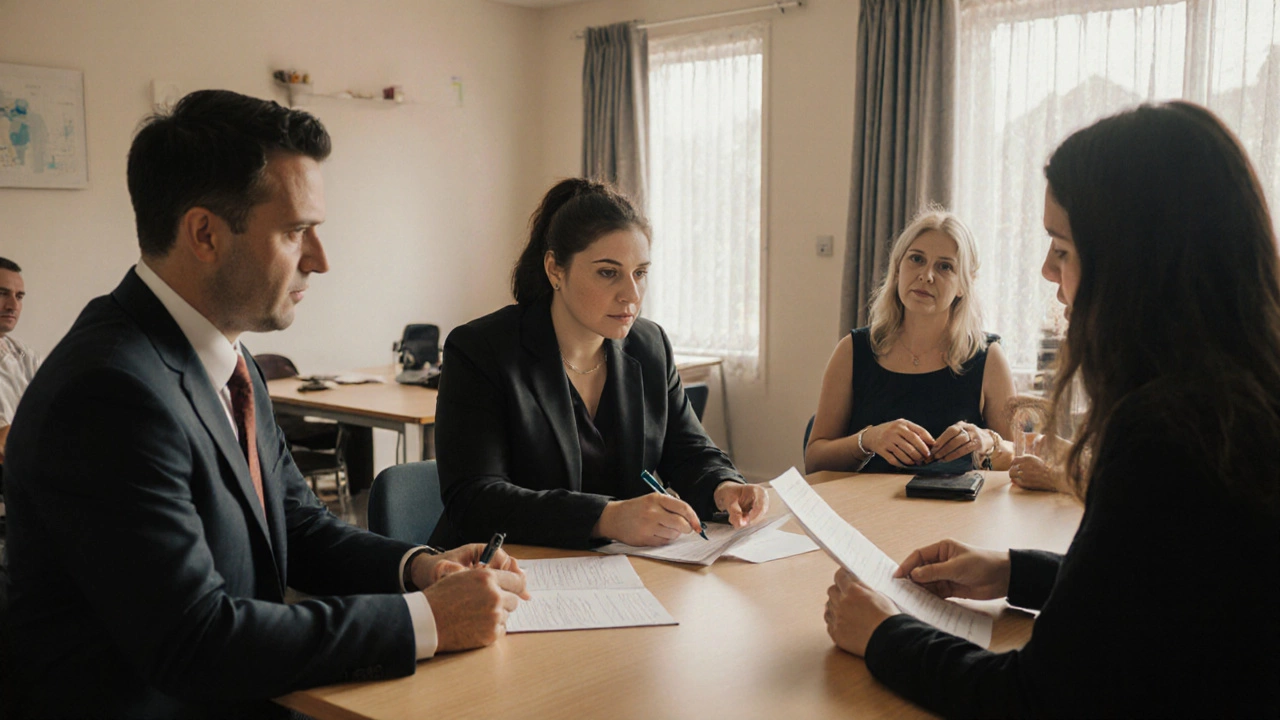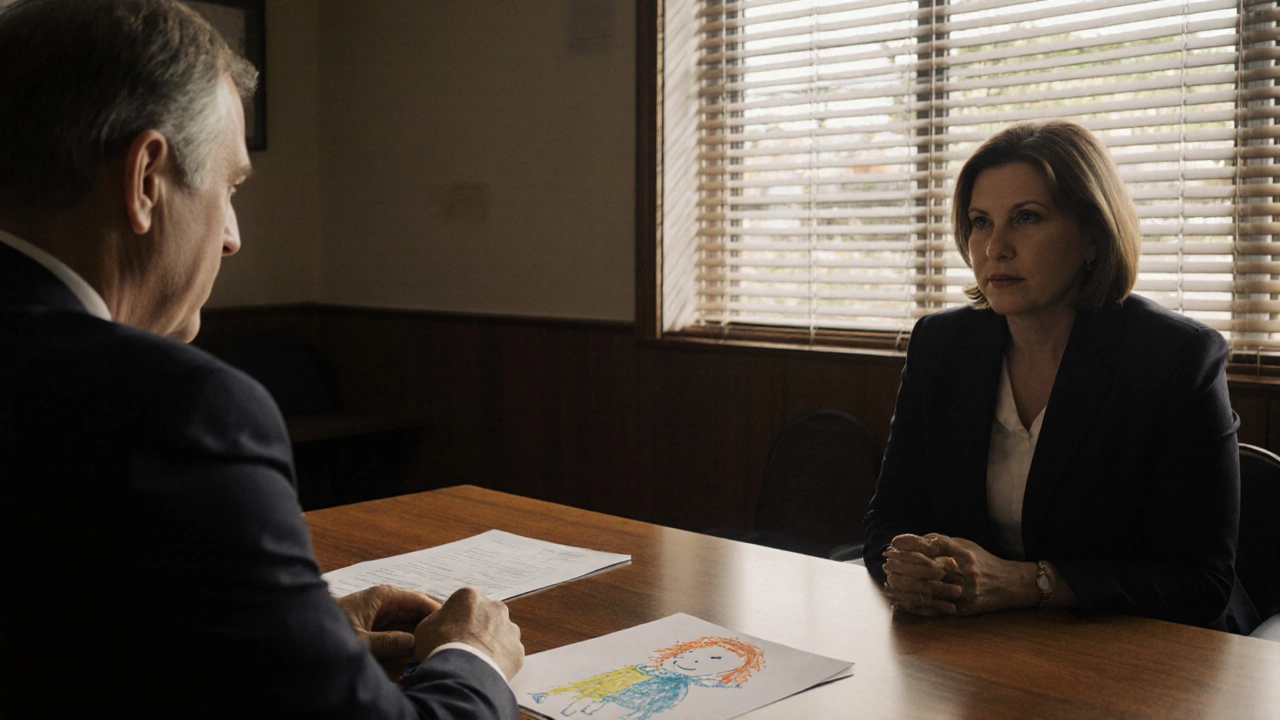There’s no single "best" type of lawyer. That’s the first thing you need to understand. Asking "which type of lawyer is best?" is like asking "which tool is best?" - it depends on the job. A hammer doesn’t fix a leaky faucet, and a family lawyer won’t help you sue a company for defective products. The right lawyer is the one who specializes in the exact problem you’re facing.
Family Law Lawyers Handle Life’s Most Personal Crises
If you’re going through a divorce, fighting for custody of your kids, dealing with spousal support, or trying to sort out property after a breakup, you need a family law attorney. These lawyers don’t just file paperwork. They navigate emotional terrain where feelings run high and decisions affect children, homes, and futures. In New Zealand, family law is governed by the Family Proceedings Act 1980 and the Care of Children Act 2004. A good family lawyer knows how these laws apply to real-life situations - like how courts decide what’s in the best interests of a child, or how shared parenting arrangements work in practice.
They also handle adoption, guardianship, and protection orders. If your partner has become violent or threatening, a family lawyer can help you get a restraining order quickly. They know which forms to fill out, which courts to go to, and how to get emergency hearings scheduled. This isn’t theoretical. In Wellington, family courts often deal with cases where one parent has moved away without notice, or where financial abuse has left someone with no access to funds. A family lawyer can get interim orders for maintenance or access while the case is ongoing.
When You Need Something Else
Not every legal problem fits under family law. If you’ve been hurt in a car crash caused by someone else, you need a personal injury lawyer. They deal with insurance claims, medical bills, lost wages, and long-term disability. Their focus isn’t on your marriage - it’s on proving fault and getting compensation.
If you’ve been fired unfairly or your employer won’t pay you overtime, an employment lawyer steps in. They know the Employment Relations Act 2000 inside out - what counts as constructive dismissal, how to file a personal grievance, and how to negotiate settlements without going to the Employment Relations Authority.
Need to start a business? A corporate lawyer helps with company structure, shareholder agreements, and compliance. Got into a dispute with your landlord over bond refunds or repairs? A tenant rights lawyer knows the Residential Tenancies Act 1986 and can help you challenge illegal eviction notices or get your deposit back.
Each of these areas requires different skills, different knowledge, and different court procedures. You wouldn’t go to a cardiologist for a broken arm. Don’t go to a criminal lawyer for child custody.
What Makes a Good Family Lawyer?
Not all family lawyers are the same. Some push for aggressive litigation. Others focus on mediation and settlement. The best one for you depends on your goals.
If you want to avoid court and keep things calm - especially if you have kids - look for someone experienced in collaborative law or mediation. These lawyers help you and your ex reach agreements outside of court. In New Zealand, the Family Dispute Resolution (FDR) service is often required before going to court, and many family lawyers are accredited FDR providers.
If your case involves abuse, hidden assets, or a partner who refuses to cooperate, you need someone who’s not afraid to go to court. They should have a track record of handling complex financial cases - like valuing a family business or tracing assets moved overseas.
Ask potential lawyers: "How many cases like mine have you handled in the last year?" and "What’s your approach when the other side won’t negotiate?" Don’t be afraid to ask for examples. A good lawyer will tell you about a case where they helped a client get shared care after the other parent tried to move away, or how they recovered hidden savings accounts during a divorce.

Red Flags to Watch For
Some lawyers promise quick wins or guarantee outcomes. That’s a warning sign. Family law is unpredictable. Judges have discretion. No ethical lawyer will say, "I’ll get you full custody." They’ll say, "Here’s what the law says, here’s what courts usually do, and here’s how we can strengthen your position."
Another red flag: lawyers who push you toward expensive court battles right away. Court is slow, costly, and emotionally draining. A good lawyer will explore alternatives first - mediation, parenting coordinators, or even counselling referrals.
Also watch out for lawyers who don’t explain fees clearly. Family law can get expensive. Make sure you know how they charge - hourly rate? Fixed fee for certain services? Are there extra costs for court filings or document preparation? Get it in writing.
How to Find the Right One
Start with referrals. Ask friends, family, or your GP if they’ve worked with a family lawyer. Many community centres and Citizens Advice Bureaus in Wellington offer free legal referrals.
You can also check the New Zealand Law Society website. They have a directory of lawyers by specialty and location. Look for those who list "Family Law" as a primary practice area.
Most lawyers offer a free or low-cost initial consultation. Use it. Bring your documents - separation agreement drafts, financial records, parenting plans. See how they listen. Do they interrupt? Do they make you feel rushed? Do they explain things in plain language, or do they talk over your head?
Trust your gut. You’re not just hiring a lawyer. You’re hiring someone to walk with you through one of the hardest times in your life. You need someone who’s professional, but also human.

What Happens After You Hire One?
Once you’ve chosen a lawyer, they’ll start by gathering facts. They’ll ask for bank statements, property titles, school records, text messages, and anything else relevant. Don’t hold back. Even things that feel embarrassing or irrelevant might matter.
They’ll then advise you on your legal rights and options. Maybe you can reach a settlement. Maybe you need to file for interim orders. Maybe you need to get a valuation of a business or property. They’ll guide you through each step.
Most family law cases don’t go to trial. Over 80% are settled before court. But being ready for court changes your leverage. A lawyer who’s prepared to go to trial can often get a better outcome in negotiations.
Stay involved. Ask questions. Keep records. And don’t let your lawyer make decisions for you - they advise, you decide.
Final Thought: The Right Lawyer Makes All the Difference
Choosing the right type of lawyer isn’t about prestige or popularity. It’s about alignment. Your problem needs a specialist. A family lawyer doesn’t just know the law - they know how to protect children, preserve dignity, and help people rebuild after breakdowns. They’re not just legal advisors. They’re guides through chaos.
If you’re facing a family crisis, don’t waste time with generalists. Find someone who lives in this space every day. Someone who’s seen this before - and knows how to help you come out the other side with your kids, your sanity, and your future intact.
Is a family lawyer the same as a divorce lawyer?
Yes and no. All divorce lawyers are family lawyers, but not all family lawyers only do divorces. Family lawyers handle a broader range of issues - custody, adoption, protection orders, property division, and spousal support. Divorce is just one part of their work. If you’re only dealing with ending a marriage, you still need a family lawyer because the law treats divorce as part of a larger family unit, not a standalone legal event.
Can I represent myself in family court?
You can, but it’s risky. Family court procedures are complex, and judges expect you to follow the same rules as lawyers. Without legal knowledge, you might miss deadlines, fail to submit key evidence, or misunderstand your rights. In cases involving children or finances, mistakes can have long-term consequences. Even if you can’t afford a full-service lawyer, consider hiring one for a consultation or limited scope help - like reviewing your documents or coaching you before court.
How much does a family lawyer cost in New Zealand?
Fees vary. Most charge between $250 and $450 per hour. Simple cases with minimal conflict might cost $3,000-$7,000 total. Complex cases with assets, businesses, or custody battles can run $15,000 or more. Some lawyers offer fixed fees for uncontested divorces or parenting plan drafting. Legal aid is available if your income is low - you can apply through the Ministry of Justice. Don’t assume you can’t afford help. Many lawyers offer payment plans or sliding scales.
Do I need a lawyer if my ex and I agree on everything?
You don’t legally need one, but it’s still smart. Even if you agree now, things change. Without a legally binding agreement, your ex could change their mind later - about custody, child support, or property. A family lawyer can turn your verbal agreement into a court-approved order that’s enforceable. This protects both you and your children. It’s not about distrust - it’s about making sure your agreement lasts.
How long does a family law case take?
It depends. Uncontested cases with full agreement can wrap up in 3-6 months. Contested cases - especially those involving custody disputes or hidden assets - can take 12 to 24 months. Court backlogs in New Zealand have grown since 2020, so delays are common. The sooner you get legal advice, the sooner you can start moving forward. Don’t wait until things fall apart. Early intervention saves time, money, and stress.
